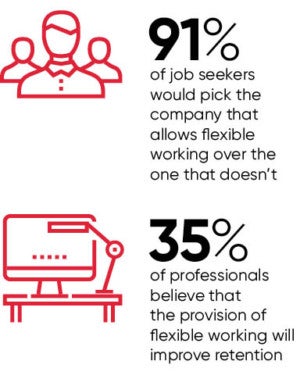 The idea that work needs to take place in a fixed location is literally an anathema to many professionals now. The great catalyst, of course, has been technology. Our always-on, connected world enables staff to work from anywhere and the appetite to do so is considerable.
The idea that work needs to take place in a fixed location is literally an anathema to many professionals now. The great catalyst, of course, has been technology. Our always-on, connected world enables staff to work from anywhere and the appetite to do so is considerable.
The demand not to be tied to a fixed desk, in a fixed geography is now uppermost in the wants of many potential employees. Our own research finds that when presented with two similar roles, a staggering 91 per cent of job seekers would pick the company that allows flexible working over the one that doesn’t. Overall, more than half of employees say any job they take has to offer some form of flexible working.
It is important not to confuse flexible working with working from home. With house prices continuing to rise faster than earnings, many staff will not physically have, or be inclined to designate, any spare space they have for work purposes. Nor are they likely to have the level of reliable technology they need to do their jobs properly.
Rather, professionals are looking to workspaces that are specifically geared towards productivity and efficiency. The UK boasts a network of stunning sites enabling workers to find a working destination nearer to home, to avoid the draining commute, and to plug in and begin working at a time and location that suits them.
Such an approach will undoubtedly require a change of mindset for many employers. They will be challenged to measure on results rather than presenteeism, and to formulate new reporting and meeting structures. But their efforts will be appreciated in the form of rising engagement from staff who feel their needs are listened to. Our research finds more than a third (35 per cent) of professionals believe that the provision of flexible working will improve retention.
The personnel benefits are broader still for businesses that think flexibly. Good companies rely on great people and the competition for employee talent is fiercer than ever. Those businesses operating from a fixed location must limit their recruitment search to a commutable catchment or expect the applicant to relocate. By operating flexibly, the potential recruitment pool extends throughout the UK, even internationally if required, with the employee able to work remotely and connect digitally.
What’s already apparent is that workplace flexibility is becoming a common feature of modern work. Rather than being seen as a novelty or a perk, a flexible approach is viewed as a basic requirement by the latest generation of job seekers. Of course, businesses need to know that such an approach delivers bottom-line results too. Working flexibly is proven to increase employee engagement and productivity, and it’s a way of working that can help secure the best people.
In fact, we are quickly getting to the point where it is not simply the provision of flexible employment terms that sets businesses apart. As professionals get used to this approach, the type and quality of workspaces chosen will take on increasing significance.
For now, businesses thinking flexibly are giving themselves the best possible chance of retaining and attracting top talent, and of providing the environment for these individuals to produce their best work. However results are measured, they should speak for themselves.
For more information please visit www.regus.co.uk





